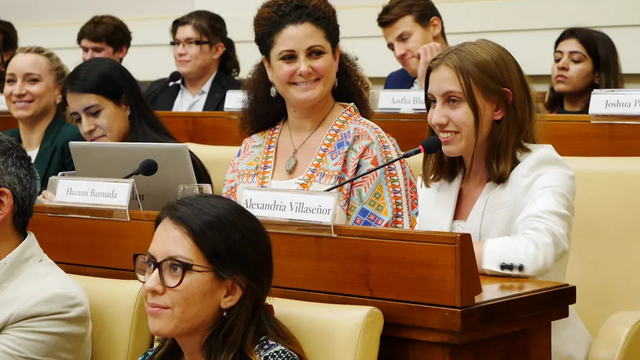SDSN Youth Hosts the Vatican Youth Symposium with the Pontifical Academy of Sciences
On October 16, 2019, SDSN Youth , in partnership with the Pontifical Academy of Sciences, hosted its fourth annual Vatican Youth Symposium in Vatican City. This year’s theme, Intergenerational Leadership: Laudato Si’ and The Sustainable Development Goals, fostered inspiring and thought-provoking discussions on topics including technology and innovation, sustainable cities and communities, education, financing, and partnerships to fortify collaborative global movements in sustainable development. Gathering more than ninety young change-makers and leading experts from various sectors, the program was packed with discussions about the action needed to make a profound impact on the 2030 Agenda, and in the words of Professor Jeffrey Sachs, “To brainstorm for action and set an agenda for the coming year.” The symposium serves as an innovation brainstorming hub—a forum where groundbreaking solutions and ideas are cultivated and where partnerships are fostered to further implementation on national, regional, and international scales.
While many young people are already contributing to the SDGs, visibility, strong networks, and lack of resources in the entrepreneurial and innovation ecosystems are hindering progress towards achieving the SDGs. In view of this, the Symposium provided a space for youth as well as leaders from civil society, faith communities, businesses, governments, and academia to exchange ideas and initiate partnerships with one another. The Italian Minister for Education, Professor Lorenzo Fioramonti said, “I believe excellence is the ability to connect one sector to another ...we need a generation that thinks in SDG terms.” As the SDGs are an all-inclusive call to action to end poverty, protect the ecosystem, and create peace and happiness, we need to create strong intergenerational relationships and the Vatican Youth Symposium does just that.
During the Symposium, SDSN Youth participated in core sessions within the thematic areas of Education and the Role of Universities and Academia in Sustainable Development; Financing for Development; and Networks, Partnerships, and Social Movements for Sustainable Development. Monsignor Marcelo Sanchez Sorondo, Chancellor, Pontifical Academy of Sciences opened the day with an inspiring message of hope and faith for the creativity of young people to be met in collaboration with the expertise of older generations to make progressive change. Ambassador Dho Young-shim, Chair, ISTO for Peace and Prosperity discussed the importance of creating inclusiveness within sustainable development education and the vital role youth must play to make the 2030 Agenda a reality.
The Education for sustainable development (ESD) Session and the Roles of Universities in Advancing Sustainable Development session both highlighted the core role that educators play in the implementation of the SDGs. The ESD session focused on the importance of empowering teachers to teach about the SDGs in schools. SDSN Youth’s Global Schools Programannounced a major partnership with local NGOs to pilot the program in three countries, Ghana, Morocco, and Turkey, enabling to localize resources and creating SDG-aligned curriculums at the national level. In addition, the session emphasized the importance of bringing all the university stakeholders into the conversation and to train as many young leaders as possible on the importance of sustainable development. SDSN Youth’s SDG Student Program and the Ban Ki-moon Centre for Global Citizens also took that opportunity to announce that the Ban Ki-moon center will officially endorse a certification program for hub coordinators.
The Financing for Sustainable Development session discussed the importance of finances in achieving the SDGs by 2030. Blaec von Kalweit, Chief of Staff of Global Citizen , addressed the audience about mobilizing practices from various sectors, "Working with the UN SDSN and the SDG Costing Group, we've concluded that the world needs an additional $350 billion to meet the 2030 agenda.” Subsequently, Djaffar Shalchi, founder of Human Act Foundation, spoke about building systems to fund the SDGs. Human Act Foundation has a donation platform that allows change-makers to donate 1% of their wealth to achieve the SDGs by 2030. Mr. Shalchi said, "A 1% change of mind is enough to solve all the 17 SDGs." If the 1% donated their 1%, this could fill the funding gap to achieve the SDGs, especially in Low-Income Developing Countries (LIDCs).
Finally, the Networks, Partnerships, and Social Movements for Sustainable Development session focused on empowering youth to act locally and think globally. Carolina Ramirez from SDSN Youth Amazonia spoke about the importance of creating awareness by generating social movements, and what the local youth are doing to bring awareness to the plight of the Amazon Rainforest. SDSN Youth Amazonia launched a fund on September 5th called ‘ Friends of the Amazon Fund’ to support the needs of the traditional communities of the 8 countries and region within the Amazonian terrain.
By gathering some of the world’s most innovative and empowering youth and leading experts in the field, attendees were able to successfully build partnerships in ways they never thought possible. Throughout the event, participants discussed ways to cross paths and create collaborative efforts and have openly expressed that the lessons learned at this years symposium will transcend far beyond the walls of the Casino Pio IV, and their determination to be the generation to curate solutions to our most pressing environmental, economic, and social issues has been further amplified.
In conclusion, this year’s symposium was a monumental achievement. With over 4.9M Twitter impressions, the impact of the Vatican Youth Symposium does not only influence those in attendance but creates a lasting impact on the vast global audience of young leaders seeking revolutionary change. For more insight into this momentous event, please view the Vatican Youth Symposium Program and participant biographies.
